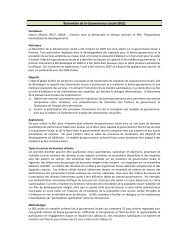A Users' Guide to Measuring Local Governance
A Users' Guide to Measuring Local Governance
A Users' Guide to Measuring Local Governance
You also want an ePaper? Increase the reach of your titles
YUMPU automatically turns print PDFs into web optimized ePapers that Google loves.
Case Studies<br />
3<br />
The following four fictional case studies demonstrate<br />
key concepts and themes raised in earlier<br />
chapters of this <strong>Guide</strong> and cover such issues as:<br />
• Facilitating commitment and involvement –<br />
the role of a local government official<br />
• Moving from government <strong>to</strong> the concept of<br />
governance – the role of a civil society activist<br />
• Balancing comparability with local relevance –<br />
the role of a representative from a local<br />
government association<br />
• Ensuring uptake of assessment findings in<br />
local policy-making – the role of a local elected<br />
government official<br />
Although the names are fictitious, examples have<br />
been drawn <strong>to</strong> approximate real-life scenarios<br />
based on actual country experiences.<br />
Case study 1:<br />
Facilitating commitment and involvement: The role of a local government official<br />
Svetlana has recently been appointed as the head of the policy unit in her municipality. She has a university degree in<br />
social sciences and has been working for an international development agency for a couple years. However, Svetlana<br />
has never been a local government official and her insight in<strong>to</strong> the everyday practices and the specific organizational<br />
culture in the municipal administration was limited.<br />
The major strategic responsibilities of Svetlana were <strong>to</strong> steer the development agenda, coordinate most critical policies<br />
and mobilize external resources. In her unit, there were only three persons and none of them had considerable<br />
experience in development cooperation.<br />
After spending a couple of months trying <strong>to</strong> find her way though the rigid, poorly organized, and highly inefficient<br />
municipal administration, Svetlana decided <strong>to</strong> initiate an assessment of local governance for her municipality.The main<br />
purpose of the assessment was <strong>to</strong> identify development needs, mobilize support from civil society organizations, and<br />
set a factual foundation for more strategic organizational change. She prepared a brief for the president of the<br />
municipality and managed <strong>to</strong> secure the participation of all key local officials at the initial meeting.<br />
The meeting ended up quite differently from Svetlana’s original expectations. First, few officials unders<strong>to</strong>od the notion<br />
of governance. She spent most of the time trying <strong>to</strong> explain <strong>to</strong> them that local governance is not only about how much<br />
money central level transfers, the cost of particular local public services, division of post in the local assembly, etc. but<br />
also includes capacity development and empowerment of local communities, and facilitating the participation of<br />
citizens and groups in decision making.<br />
Second, she faced great resistance from those that became concerned that conducting an assessment would produce<br />
a bad image of local officials.They argued that providing the local community a chance <strong>to</strong> express their concerns would<br />
publicly expose “dirty laundry” as well as weakness and failures of the local administration. Finally, Svetlana was<br />
strongly criticized for not being able <strong>to</strong> say “how much money this would bring us” and what other concrete benefits<br />
would come from conducting such an assessment.<br />
A Users’ <strong>Guide</strong> <strong>to</strong> <strong>Measuring</strong> <strong>Local</strong> <strong>Governance</strong> 35








![GuÃa del Usuario ] - Governance Assessment Portal](https://img.yumpu.com/44740603/1/190x253/gua-a-del-usuario-governance-assessment-portal.jpg?quality=85)







